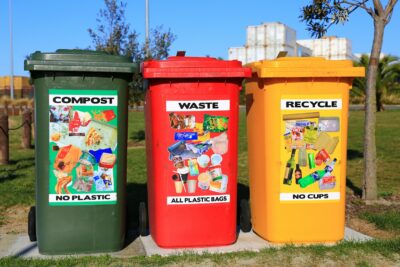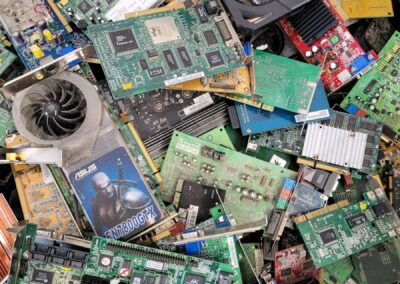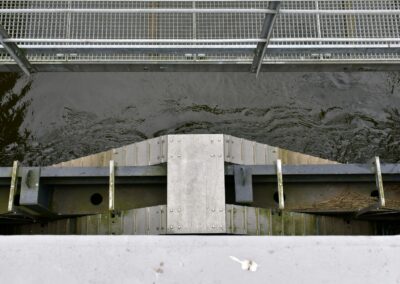Revolutionizing Waste Management in Smart Cities with Digital Twins
The Role of Digital Twins in Smart City Waste Management
The integration of digital twins in smart cities represents a transformative advancement in waste management, offering innovative solutions for optimizing collection routes and schedules. A digital twin is a virtual representation of a physical entity, in this case, a city’s waste management system, allowing for real-time monitoring and simulation of various operational aspects. By implementing digital twins, city planners and waste management professionals can create detailed simulations of waste collection processes, enabling them to refine and enhance operations effectively.
In smart cities across Saudi Arabia and the UAE, digital twins play a crucial role in managing urban waste more efficiently. By simulating waste collection routes and schedules, these digital models help optimize routes to minimize fuel consumption, reduce vehicle emissions, and ensure timely waste collection. For business executives and city managers, the ability to analyze and predict the impact of different waste management strategies through digital twins can lead to significant improvements in operational efficiency and environmental sustainability.
Moreover, digital twins provide valuable insights into waste generation patterns and collection needs. This data-driven approach allows cities to better allocate resources, adjust collection schedules dynamically, and respond to changes in waste production in real-time. As smart cities in Riyadh and Dubai continue to grow and evolve, leveraging digital twins for waste management will be essential for maintaining high standards of urban cleanliness and sustainability.
Optimizing Waste Collection Routes and Schedules
One of the primary benefits of using digital twins in waste management is the ability to optimize collection routes and schedules. Traditional waste collection methods often involve static routes that do not account for real-time changes in waste production or traffic conditions. Digital twins address this challenge by providing a dynamic, data-driven approach to route planning and scheduling.
By simulating different collection scenarios, digital twins enable cities to identify the most efficient routes, minimize operational costs, and reduce environmental impact. For example, waste management systems in Dubai can use digital twins to analyze traffic patterns, adjust routes based on real-time conditions, and optimize vehicle loads. This approach not only improves the efficiency of waste collection but also enhances the overall sustainability of urban waste management practices.
Additionally, digital twins allow for better forecasting and planning of waste collection schedules. By analyzing historical data and predicting future waste generation trends, cities can adjust collection frequencies and allocate resources more effectively. This proactive approach ensures that waste is collected promptly, reducing the likelihood of overflow and maintaining high standards of public health and sanitation.
The Impact of Digital Twins on Smart City Waste Management
The application of digital twins in smart city waste management offers significant advantages, including cost savings, environmental benefits, and improved operational efficiency. For cities in Saudi Arabia and the UAE, adopting this technology can lead to more sustainable and effective waste management practices, aligning with broader goals of urban development and environmental stewardship.
Digital twins contribute to cost savings by optimizing waste collection routes, reducing fuel consumption, and minimizing vehicle wear and tear. Additionally, by improving collection efficiency and reducing operational costs, cities can allocate resources more effectively and invest in other critical areas of urban development. The environmental benefits of digital twins are also substantial, as optimized waste collection reduces greenhouse gas emissions and supports sustainable urban growth.
In summary, the use of digital twins in smart city waste management represents a significant advancement in urban planning and environmental sustainability. By leveraging this technology, cities can enhance waste collection processes, optimize resource allocation, and achieve a higher level of operational efficiency. For business leaders and city planners in Riyadh, Dubai, and beyond, embracing digital twins will be key to building smarter, more sustainable cities in the future.
Conclusion
Digital twins offer a powerful tool for improving waste management in smart cities, enabling more efficient collection routes and schedules through advanced simulations and real-time data analysis. For cities in Saudi Arabia and the UAE, implementing digital twin technology can lead to cost savings, environmental benefits, and enhanced operational efficiency. As urban areas continue to grow and evolve, digital twins will play an essential role in developing sustainable waste management practices and achieving smarter city solutions. Embracing this technology will ensure that cities can effectively manage waste, optimize resources, and contribute to a cleaner, more sustainable future.
—
#DigitalTwinsSmartCities #WasteManagementOptimization #SmartCityTechnology #DigitalTwinsDubai #RiyadhWasteManagement #UAEUrbanSustainability #SaudiArabiaSmartCities #DigitalTwinTechnology #UrbanWasteManagement























